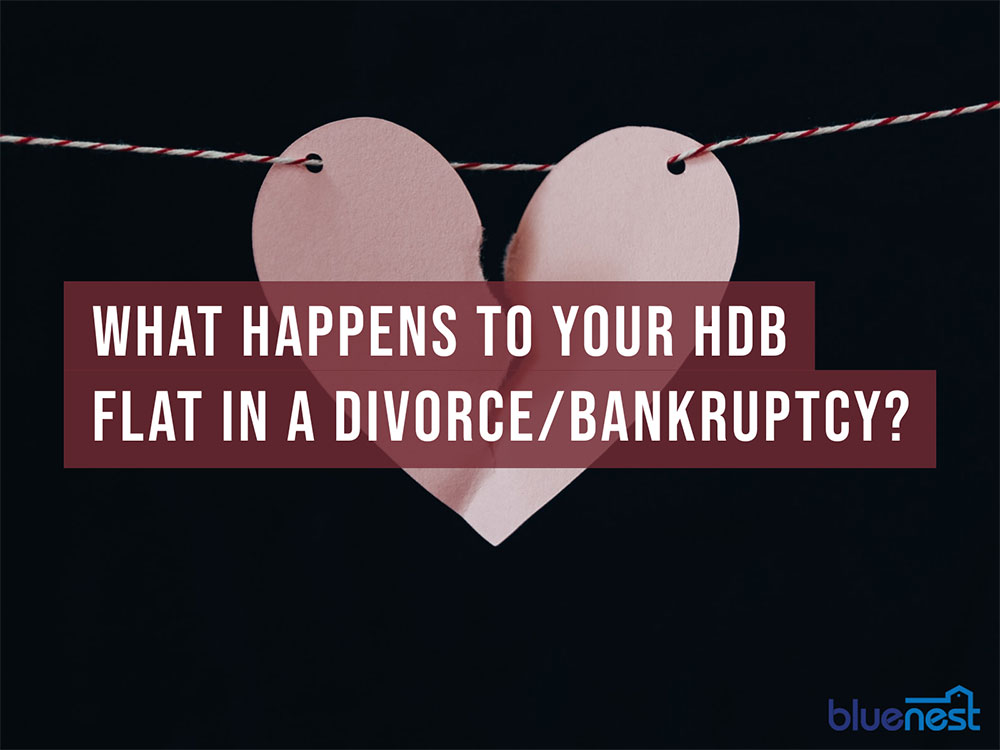
Divorce and bankruptcy are two social taboos in Singapore. If these two topics come out in a conversation, you know it can end quite awkwardly.
But as far as difficult conversations go, this is still something we have to talk about — simply because the numbers don’t lie. There are an average of 7000+ divorces and nearly 3000 bankruptcy applications every year, making this a pressing concern for many individuals.
Getting past the emotional trauma and heartbreak, there are a few glaring questions to address. What happens to your HDB flat when you’re divorced or bankrupt in Singapore? If you sell your flat, how will the proceeds be managed?
There’s more work in a divorce in Singapore than just signing papers. If you and your (ex-)spouse applied for the flat in a joint application, the property is considered a matrimonial asset. However, if you inherited or purchased the property before getting married, your flat may not be included in the asset arrangements during a divorce.
Don’t be too quick to celebrate yet. Your house may be considered a matrimonial asset by law if it fulfills the following:
That’s right, all’s fair in the eyes of the law. You may have to share that beloved last gift from your late grandparents even after the breakup of the marriage.
You may deal with more restrictions trying to retain your flat than if you’d owned a private property. For instance, unlike with private properties, you can’t settle the ownership of your flat with an internal arrangement between you and your (ex-)spouse. You’ll still have to qualify under one of HDB’s schemes to retain your flat.
Fortunately, one of those schemes is to your benefit if you have children to care for. You can retain the HDB flat by citing your kids as the main reason, since the government wants to make sure the children have a roof over their heads.
Of course, you must prove to be financially capable of taking on the HDB loan on your own (if it’s not fully paid off).
You can retain your flat via the Single Singapore Citizen Scheme (SSC) if you fulfill all of the following:
*If you purchased your flat with the Family Grant, you’ll still have to fulfill the 5-year MOP to keep your flat. Alternatively, you can include your parent’s or sibling’s name to retain the flat, provided they don’t currently own any other properties.
Sadly, you’ll have to say goodbye to your flat.
There’s one big caveat though: you must fulfill the Minimum Occupancy Period (MOP) of 5 years to sell your flat in the open market.
If not, you’ve got no choice but to return it to HDB at the prevailing compensation price. HDB will determine what this is, but it may not be a better value than what you can fetch in the open market.
Unfortunately, you won’t become cash-rich overnight.
The sale of your HDB will first go towards paying off your remaining mortgage and reimbursing the amount drawn from your CPF. Rest assured that you’ll still get your accrued interest. You’re not missing out on anything.
Then, the court will decide how the remainder will be divided. Still, you take what you can get: it’s better than getting nothing.
You get to keep your HDB and CPF savings even when you’re bankrupt. You won’t have to worry about being forcefully evicted from your home. Log in to your CPF account to check your CPF savings.
However, you will have an Official Assignee (OA) who will evaluate and manage your assets. If you’ve lost the means to finance the HDB, you may be downgraded to a smaller HDB unit that’s within your means.
Your bankruptcy filing comes with a new “spouse.” The OA has to approve every asset-related decision you make. You’ll likely get approval to sell your flat if it’s to downgrade, but even so, you won’t have a say on where the sales proceeds will go.
There’s no chance to splurge on a good meal or fly out for a holiday: your majority of your incoming cash proceeds will be diverted towards paying off your debts.
While the OA will ensure that you and your family have enough to get by, anything else (like taking a taxi) is deemed as “luxurious” and will be taken away from you.
Sadly, there’s nothing you can do till your debts are fully paid. You have no rights. You have no say. You long to be free one day.
Regardless of whether you’re going through a divorce or bankruptcy, we can’t imagine the ordeal you’re going through. We hope that this article made your life transition easier. If you require the help of a trusted professional, you can contact us directly and we’ll link you up with the relevant advisers.
Bluenest. Your trusted advisor, all the time.